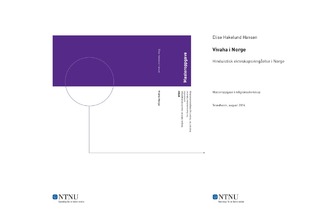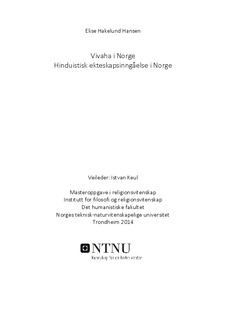| dc.description.abstract | Diaspora Hinduism is Hinduism practiced outside India, Nepal, and Sri Lanka. The main focus of this master’s thesis is the diaspora Hinduism in Norway. The first Hindus settled in Norway in the 1960’s, while the majority of Hindus in Norway arrived as late as in the 1980’s. Today, 6 797 Hindus are members of different Hindu belief communities and temples; however, this number is somewhat misleading because it is likely that less than 40 % of the Hindus are members of such communities. In the 1990’s, the first Hindu temple was established in Norway. For many Hindus, Hinduism is the practice of rituals, and many of the rituals are also practiced in diaspora. Some of the most important Hindu rituals are rites of passage. These rituals are carried out in order to ease the passage from one stage of life to another. Out of the different rites of passage, vivaha is considered to be of particular importance. Vivaha is the rite of marriage, and it is this Hindu ritual which constitutes the main focus of this thesis. In this context, I have developed the following research question: How does diaspora affect the vivaha ritual in Norway? In order to answer this question I have used the qualitative methods of observation and interview in approaching my informants who have practiced the vivaha ritual. The methodology was chosen in order to gain knowledge about the vivaha ritual as well as information about how the couples reflected on the different decisions to be made in relation to the ceremony.
The background for my master’s thesis is a discussion that Knut A. Jacobsen wrote about in 2011 where Hindus felt put aside in public debates about arranged marriages in Hinduism. They felt that Muslims have this right, but that the Hindus were not considered as being representative of this topic (Jacobsen 2011: 112,114). Therefore, I wanted to focus on marriages in Norway, in order to give Hindus a public face.
My research shows that the reflections on the type of marriage, who to marry, where the marriage is going to take place, and whether the vivaha ritual is the only ceremony the couple is going to carry out in order to get married influence vivaha. Therefore vivaha is viewed as something more important than only the ceremony itself. I have observed two vivaha ceremonies at the Sanatan Mandir, a Hindu temple in Slemmestad. Vivaha ceremonies can be carried out in different ways because local traditions can change the ritual and the different families and villages often approach vivaha in their own ways. Therefore, it is difficult to conclude that the vivaha ritual is influenced by diaspora alone. Nevertheless, I find that vivaha, being something greater than only the ceremonies, is influenced by the different reflections and choices the couples make before they get married. | nb_NO |

